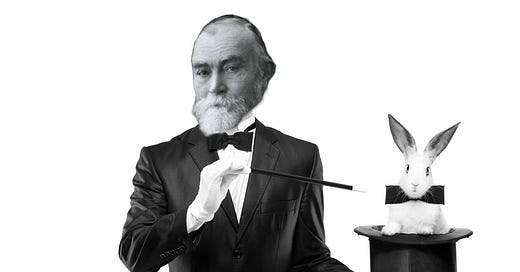You know to be wary when something seems too good to be true. When an “investor” tells you he’ll double your money overnight, you hold on to your cash. When someone offers you $1k a week to be their “virtual assistant,” you ask if it involves cashing any checks. And when a GIF shows you how to make infinite chocolate, you’re not gullible enough to actually try it, except maybe to work out the illusion for yourself.
Now imagine a philosopher says he’ll prove the ultimate nature of reality. Actually, you don’t need to imagine this; they do it all the time. They’ll prove that the external world exists, that mind is distinct from matter, that atoms are indivisible or that time is interminable—with nothing but logic and a bunch of things you already believe.
Do you trust him? Or is it too good to be true?
The birds and the bees of philosophical certainties
Most of our everyday inferences are generalizations from prior experience. Every morning so far the Sun has risen; therefore, I infer, the Sun will rise tomorrow morning too. These are inductive arguments, and though they’re often reliable, they aren’t guaranteed to work. It’s still logically possible that tomorrow will be different, even if it’s unlikely.
But philosophers aren’t satisfied with this uncertainty if they think they can avoid it. And so, when possible, they reach for another kind of argument, the much stronger class of deductive arguments, which can guarantee that their conclusions are true (on the condition, of course, that their premises are true). This guarantee is made possible by logic, whose trivially true inference rules hold for all propositions purely as a matter of form. For example:
If Joe is a bachelor, then Joe is unmarried.
Joe is a bachelor.
Therefore, Joe is unmarried.
This is an instance of the deductive form modus ponens:
If P then Q
P
Therefore, Q
It doesn’t matter what you sub in for P and Q; you’ll still have a logically valid argument. As long as you know that the two premises are true, you know for sure that the conclusion is also true.
And so logic yields a special epistemic surplus. It lets us learn about the world by doing nothing but reflecting on what we already know, and without any of the doubt that accompanies ordinary empirical investigation.
Sounds great. But maybe too great. It sounds too good to be true.
Well, it is too good to be true, at least according to the paradox of analysis, which says that a deduction can’t be both true and informative.1 The conclusion of a deductive argument is only guaranteed because it’s trivial. But if it’s trivial, then it shouldn’t be able to tell you anything new. So if the conclusion does tell you something new, it doesn’t follow from the premises. And if it doesn’t tell you anything new, then why bother making the argument? Either way, the paradox of analysis makes logic look useless.
The paradox of analysis is not really a paradox—at least not in the sense of a deep irresolvable contradiction (like, say, the liar paradox). It’s not a paradox to say that logic isn’t worth doing. But philosophers call it a paradox because they firmly believe that logic is worth doing.
The expectation that logical truths can generate surplus epistemic value is the foundation of contemporary analytic philosophy. It’s the point of doing all that logical analysis in the first place. And who can blame them? We’d all like to get out more than we put in. If the infinite chocolate hack actually worked, you wouldn’t blame the chocolatiers for using it either. But the infinite chocolate hack doesn’t work. If something seems too good to be true, it probably is. And the miraculous surplus value of logic is no exception. Behind every productive application of logic is a subtle sleight of hand, a trick of misdirection, a logical fallacy in the guise of a logical truth…
Equivocation
A logical fallacy is—or is supposed to be—a logical mistake. The problem is that most so-called logical fallacies aren’t fallacious and don’t actually have anything to do with logic. Most of the big ones, like ad hominem, ad populum, appeal to authority, the naturalistic fallacy, and so on, are really complaints about an argument’s premises and not its logical structure. (“You suck, and if you suck you’re wrong, therefore you’re wrong” is a perfectly valid argument, even if the premises are questionable.)
But one logical fallacy that actually deserves the name is equivocation, which you commit when you make an invalid argument look valid by using the same word to mean two different things. For example:
Taylor Swift is a star.
A star is a giant ball of gas.
Therefore, Taylor Swift is a giant ball of gas.
I’m sure you don’t find this argument convincing, unless you hate logic and really hate Taylor Swift. We’re familiar enough with the two different senses of “star” that the sleight of hand is obvious. But if you lack this familiarity, or if it just doesn’t occur to you that a word might be used in two different ways, equivocation can fly under the radar. Replace the references to familiar things like Taylor Swift, stars, and balls of gas with dummy words, and it looks like a straightforwardly logical argument:
Doop-Doop is a blark.
A blark is a dweep.
Therefore, Doop-Doop is a dweep.
Equivocation exploits an ambiguity to produce an argument that looks valid with premises that look true, but not true in the same sense. If you’re wise to the ambiguity, you laugh and move on. But if not, you’re liable to draw all sorts of illogical conclusions, and be none the wiser.
Universal Ambiguities
You’ve probably already guessed my thesis: the sleight of hand that creates logic’s illusory surplus value is equivocation. But it can only be a special kind of equivocation, because while logic is universal, most ambiguities are not.
Equivocation usually exploits ambiguities that exist only for a particular expression. “Star” is ambiguous between “celebrity” and “giant ball of gas”, but most words don’t have even one of those meanings. If logic universally equivocates, then it should exploit a universal ambiguity— one that exists for every word and not just for some.
One kind of universal ambiguity arises from the convention of using words to refer to themselves. Philosophers call this the use-mention distinction, and it’s a particularly fruitful source of wordplay and puns:
What’s orange and sounds like a parrot?
A carrot.
This kind of ambiguity is so pervasive and annoying that philosophers came up with a convention to disambiguate it: they use quotation marks to indicate when a bit of language refers to itself instead of its usual referent. A carrot doesn’t sound like a parrot (or anything, really), but “carrot” sounds like “parrot.” A carrot is orange, but a “carrot” is not. It’s a useful convention, though it does tend to ruin jokes, since in these cases the equivocation between words and objects is the joke.
But I won’t argue that logic universally commits a use-mention confusion. When I infer that Joe is a bachelor and therefore unmarried, I’m not confusing the man Joe with the name “Joe”. Besides, everyone knows that words can refer to themselves. Any ambiguity responsible for such widespread error should be less… obvious.
But the use-mention distinction isn’t the only ubiquitous ambiguity in language. Words can refer to themselves, but words can also refer to their own meanings. And, funnily enough, Gottlob Frege’s work on this distinction is widely credited as the beginning of analytic philosophy. (This should be your first hint that his distinction is the source of our philosophical black magic.)
Frege distinguished the sense of an expression—its meaning—from its reference—the object in the world it picks out. He was inspired by cases where an expression is used to refer to its own sense instead of its usual reference. For a simplified case, consider:
My dog believes it’s time to eat.
What is it that my dog believes? “It’s time to eat” isn’t a noun, not in the ordinary sense; in fact, it’s a whole sentence all on its own. And while words usually refer to objects, sentences don’t. So what does this sentence refer to? Frege thought, for somewhat obscure reasons that are besides the point, that a sentence usually refers to its truth value (the True or the False). But my dog doesn’t believe “True”, whatever that might mean. And what my dog believes isn’t the words, either, because he doesn’t speak English and couldn’t conceptualize them if he tried. What my dog believes is what the sentence “it’s time to eat” means.
This is the ambiguity that logic exploits to produce its surplus epistemic value.
Logical Entailment and the Meaning of Names
I said that the ambiguity between a word’s referent and its meaning was universal. But it might not be truly universal. Usually an expression’s meaning is what connects it to its referent. “The president of the United States” refers to Biden because Biden is the president of the United States; the meaning of the description picks him out. But why does the name “Biden” refer to Biden? Is it because of the meaning of the name, or because of something else?
Just how proper names (like “Biden”) refer to people is a long-standing debate in analytic philosophy. On the one hand, if names are meaningless, it’s mysterious how they refer to anything. Meaning, after all, is the bridge between words and the objects to which they refer. But, on the other hand, meanings carry logical entailments; and allowing proper names to carry these logical entailments has all kinds of absurd consequences. For example, if “Biden” means “the president of the United States”, then it is a logical truth that Biden is the president: “Biden is the president” would mean the same thing as “the president is the president,” and it could never be false that Biden is the president. (So much for the kamalanomenon.) If Plato means “the student of Socrates that wrote The Republic”, then if it turns out Socrates was merely fictional, it also follows that Plato never existed. After all, someone that never existed can’t have any students.
If all proper names carry these meanings, then we can’t refer to anyone at all without treating our assumptions about them as logical truths. It could turn out that the person you thought was standing in front of you doesn’t really exist—not because there isn’t anyone there, but because you thought their mother’s name was Sharon when it was really Cheryl. To avoid these pointless confusions, it’s natural to want a way to talk about people without treating any of our assumptions as a strict definition. And that is why many philosophers of language place their hopes in theories of names that connect names to their objects directly without the need for intervening meanings.
Now, I don’t know (or care) which is the correct theory of proper names. The lesson is that objects don’t have logical entailments. But meanings do.
A Kafkaesque Court Case
You’re on trial for a crime you didn’t commit. The prosecutor says you stole a portrait from the Oval Office.
He begins with some definitions. “For ease of reference, stipulate that ‘Meany McMeany’ refers to the defendant.”
Everyone nods. Sure, it’s unprofessional, but there’s nothing fallacious here. A stipulation is a stipulation; you can stipulate any word to refer to anything.
He continues. “Now, I will define ‘Meany McMeany’ to mean ‘the person who stole the portrait from the Oval Office.”
Everyone nods again. A definition is a stipulation, too; you can define an expression to mean anything you please.
“You see,” he says, “my argument is quite simple. The defendant is Meany McMeany, as we all agreed. And likewise we agreed that ‘Meany McMeany’ means ‘the person who stole the portrait from the Oval Office’. Therefore, the defendant is the person who stole the portrait from the Oval Office.”
He rests his case. How do you respond?
Equivocating Meaning and Object
It’s permissible to stipulate that a word refers to a particular object. And it’s permissible to define a word with a particular meaning. But it is not permissible to do both simultaneously. Otherwise, when you equivocate between a stipulated reference and a stipulated meaning, you sneak in your own assumptions under the guise of a logical truth, and logic “proves” too much.
Imagine an isolated group of people who lack any concept of mental health and talk instead of demonic possession. An anthropologist tells them that demons do not exist. The group finds this preposterous, and their leader approaches to prove her wrong. He leads the anthropologist to someone suffering from the (purported) symptoms of demonic possession and gestures to him. “See, this young man is suffering from demonic possession; his behavior is erratic, and he is foaming at the mouth, with wild and unfocused eyes. Surely you can’t deny what you see with your own eyes! This young man’s condition is real. We are not imagining it. But if demonic possession is real, then it follows that demons are real as well. Therefore, demons must exist.”
Here again the mistake is an equivocation between an object—in this case, the young man’s condition—and a description, namely its description as demonic possession, which carries logical entailments like the existence of demons. We can stipulate that “demonic possession” refers to his condition, but then we no longer have license to draw any inferences from its meaning. And if we retain our right to draw inferences from its meaning we can no longer take for granted that it applies to his condition.
Any apparent certainty gained by this argument comes from shifting the relevant uncertainties elsewhere. Insofar as it’s certain that the young man suffers from demonic possession, it’s uncertain that demonic possession entails the existence of demons. And if it’s certain that demonic possession entails demons, it’s uncertain that his condition is demonic possession. The former follows if we take the reference of “demonic possession” for granted; the latter, its meaning. But we cannot stipulate its reference and its meaning simultaneously. Logic ensures the certainty of the inference only by sacrificing the certainty of the reference. We can choose where to allocate our uncertainty, but that is not the same as resolving it.
This is the sleight of hand that produces logic’s apparent epistemic surplus. Premises are justified by reference to objects in the outside world. But these objects are represented in the argument through descriptions, through meanings, and it is these meanings that carry the logical entailments that ensure deductive certainty. And we cannot take these meanings for granted without leaving their references up for grabs. Any new certainties gained by a logically valid argument generate new uncertainties about whether the arguments’ premises describe the world in the first place.
For example…

Take Moore’s argument for the existence of an external world:
Here is one hand, and here is another.
There are at least two external objects in the world.
Therefore, an external world exists.
When Moore raises his hands, he performs an act that only the most radical skeptic could deny. It seems certain that this act occurred, just as it’s certain to the anthropologist that the young man is suffering from a delirious condition. To indicate the objects involved in this act, Moore uses the expression: “Here is one hand, and here is another.” And so far this is unobjectionable.
The second premise draws from the logical entailments of the first. Part of what it means to be a hand, he says, is to be an object in the world. Fair enough; this is a perfectly good definition of “hand”, one that many will be inclined to agree with.
But if we take this definition of “hand” for granted, then the first premise is no longer a trivial observation of an objective event. It becomes loaded with assumptions, including the assumption that there is an external world—the very thing that Moore’s argument is meant to prove. The first premise is obvious in virtue of an object (his act), and the second premise is obvious in virtue of a meaning (the meaning of “hand”), but when Moore takes for granted both the act and his description of it he sneaks in all of the information that his argument allegedly proves. He literally and figuratively commits a sleight of hand.
Conclusion
Logic is a logical fallacy. Or, more accurately, every use of logic is fallacious whenever it endeavors to prove something over and above what’s already known.
This doesn’t mean that logic is useless. Even if it just moves the uncertainties around, we can use it to set the terms of debate and clarify what’s at stake. Logic gives structure to philosophical problems. But it doesn’t solve them.
So I guess it’s time we accept what the chocolate industry knew all along: you can’t get something for nothing.
I take some liberties in reinterpreting the paradox of analysis in terms of deductive arguments rather than analytic definitions. Nobody wants to listen to me redefine these concepts from scratch. This is for a general audience, nerds.









One of the best examples of an equivocated syllogism I have ever seen was in a debate between Lawrence Krauss and WLC:
1. All mammals exhibit homosexual behavior
2. WLC is a mammal
I forget what the conclusion was. Probably "There is/is not a God", depending on who was making the argument. I forget. I was so busy coming up with nouns that could refer either to sets of objects or individual objects to construct similar syllogisms that I missed the debate
Very good analysis!
“ The conclusion of a deductive argument is only guaranteed because it’s trivial. But if it’s trivial, then it shouldn’t be able to tell you anything new. So if the conclusion does tell you something new, it doesn’t follow from the premises. And if it doesn’t tell you anything new, then why bother making the argument? Either way, the paradox of analysis makes logic look useless.”
Unfortunately, this seems to be the same type of equivocation that you deride in the rest of your post! “Trivial” has two different meanings that are being traded off of here. Mathematical proofs are “trivial” but not “trivial”; especially because our minds are finite and cannot know every infinite possibly true thing of a deductive system.
Furthermore, how have you reached the conclusions that you do in your post? With logic? If so, then by your own admission, it was trivial. If, on the other hand, you used logic profitably here, then there is some explaining to do. At present, you have good examples of a particular way language and argumentation can be misused, but I’m not sure if that can bear the weight of your title.